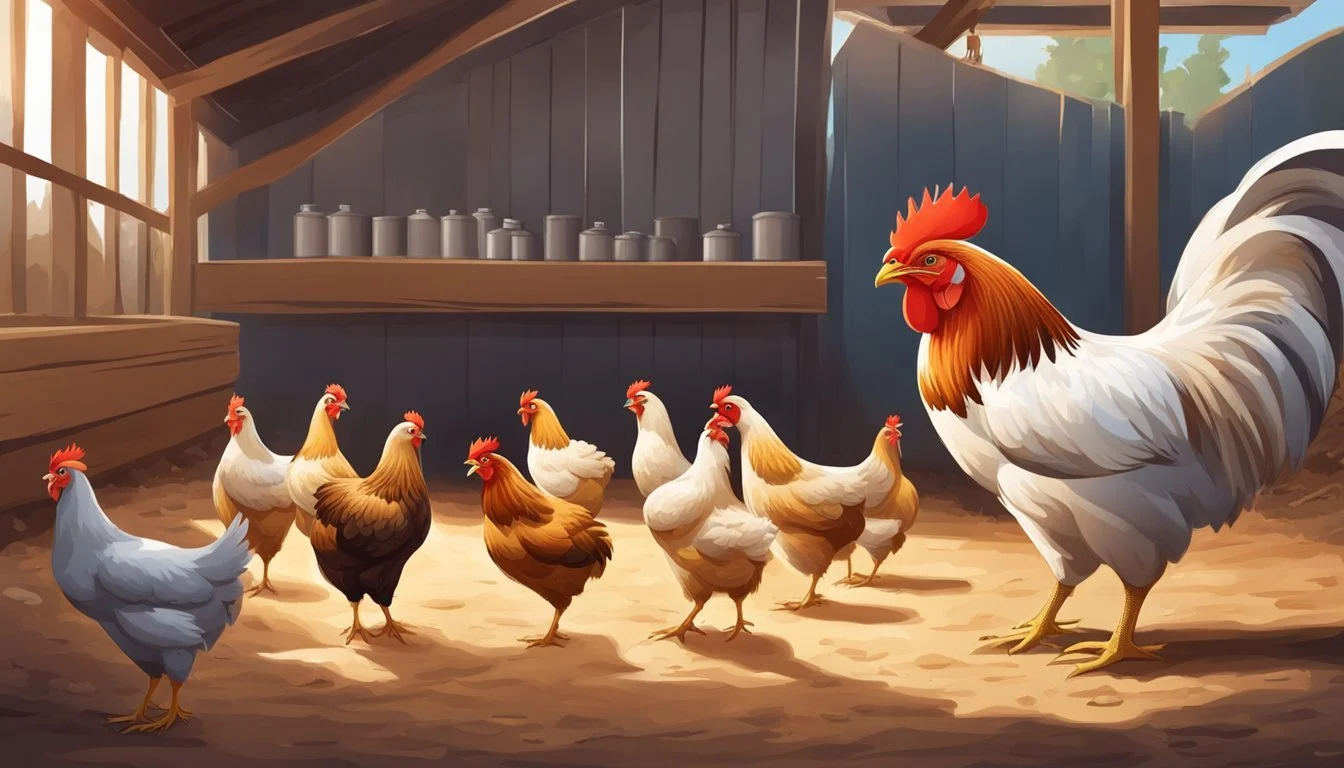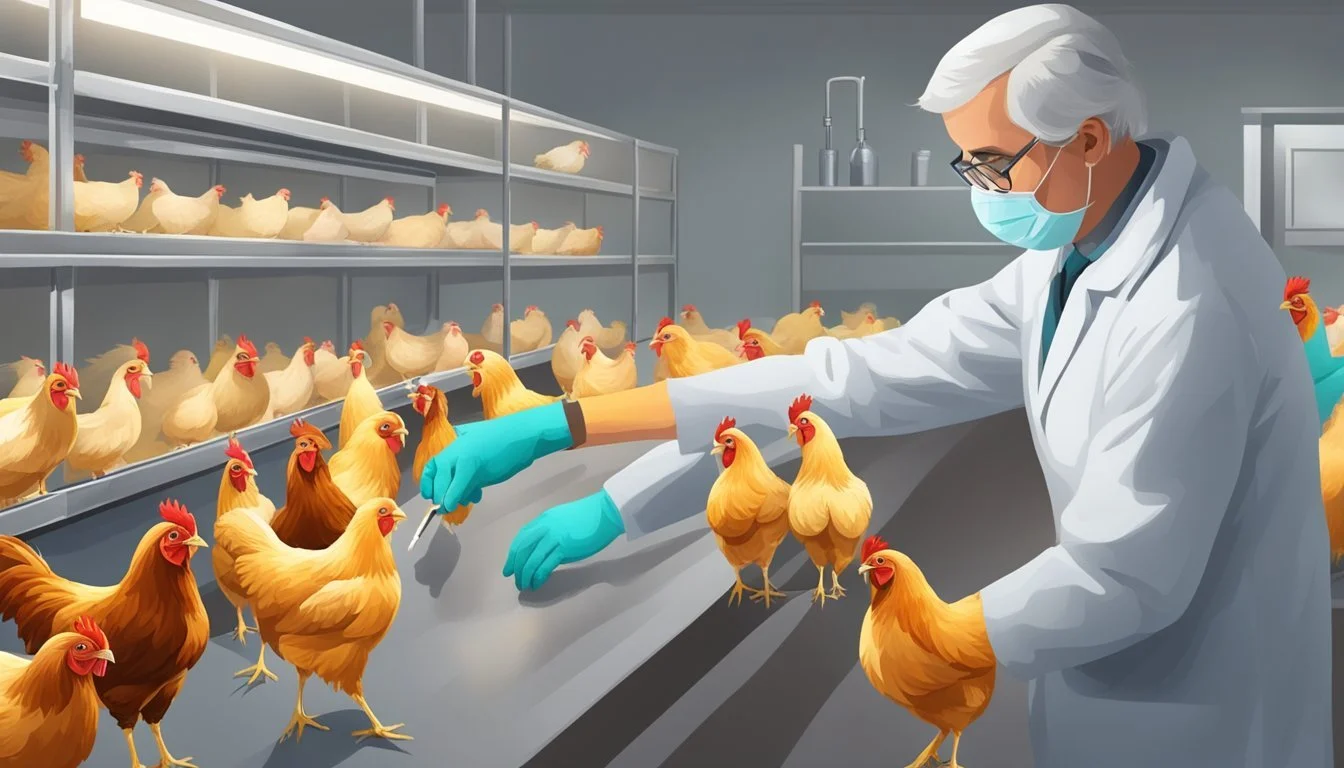How do I Vaccinate My Chickens?
Essential Steps for Protecting Your Flock
Protecting the health of backyard chickens is a primary concern for poultry enthusiasts. Vaccination is one of the most effective methods to ensure that chickens remain healthy and have a robust immunity against common diseases. Knowledgeable poultry owners understand that vaccinations can prevent the outbreak of diseases such as Marek's Disease, which can have devastating effects on a flock.
Vaccination procedures vary depending on the disease being targeted and the vaccine type. For many chicken owners, vaccinating at the hatchery is a convenient option as it allows for professional handling and reduces the chances of disease spread among young chicks. Marek's Disease, in particular, is a concern from an early age, prompting many to vaccinate chicks during their first days of life.
It's important for owners to know the schedule and method of vaccination appropriate for their chickens. Some vaccines are delivered through water, while others require a more direct approach, such as an injection or stabber. By staying informed and proactive, poultry owners can maintain the health of their chickens and provide them with the best chance for a productive life. The vaccination process has become a streamlined part of chicken care for owners who wish to safeguard their flocks against preventable illnesses.
Understanding Poultry Vaccination
Vaccinating chickens is a common practice aimed at protecting the flock from a range of diseases, which can not only affect the health of the birds but also impact egg production and overall poultry management. Proper vaccination helps in disease prevention and improving the flock's immune system.
Basics of Vaccines and Vaccination
Vaccines are biological preparations that provide immunity against specific diseases. They stimulate the immune system to recognize the disease-causing organism and fight it off. There are different methods of administering vaccines to poultry including injection, oral, and aerosol routes.
Common Diseases in Chickens
Several infectious diseases such as Newcastle disease, infectious bronchitis, fowl pox, and infectious bursal disease pose significant risks to poultry. These can be highly contagious and without vaccination, the diseases can spread rapidly through a flock.
Benefits of Vaccinating Your Flock
Vaccination is essential for disease prevention in chickens. It can reduce disease spread, decrease mortality rates, and maintain optimal egg production. A well-vaccinated flock is generally healthier and more productive.
Vaccine Types and How They Work
Vaccines for poultry come in different forms like live vaccines, which contain a version of the living microbe that has been weakened, and inactivated vaccines, which contain killed pathogens. Live vaccines usually induce stronger and longer-lasting immune responses than inactivated vaccines.
Pre-Vaccination Considerations
Before administering vaccines, it is critical to evaluate the health of the poultry and ensure that the environment and birds are adequately prepared for vaccination. This preparation helps to maximize the vaccine's effectiveness and the health benefits for backyard chickens.
Assessing Flock Health
Regular health assessments are imperative to ensure that the birds are in optimal condition for vaccinations. It is important to isolate any sick bird to prevent the spread of avian diseases. A vet should be consulted for a thorough health check of the flock prior to scheduling vaccinations.
Biosecurity Measures
Implementing strict biosecurity measures is crucial in preventing the spread of pathogens like Salmonella among backyard chickens. This includes protocols such as quarantine for new birds, disinfecting equipment, and restricting access to the poultry area by visitors and other animals.
Choosing the Right Vaccines
Selecting appropriate vaccines for a backyard flock involves understanding prevalent diseases in the region and being aware of the specific needs of the flock. Consulting with a veterinarian is recommended to tailor the vaccination program to local disease risks and flock composition.
Understanding Vaccine Schedules
Vaccination schedules are comprised of initial doses followed by booster shots. The timing and frequency of these boosters are dictated by the type of vaccine and the diseases they are formulated to protect against. A veterinarian can create a vaccination calendar detailing when each vaccine should be administered to maintain flock immunity.
Vaccination Procedures
Vaccinating your chickens is a critical step in ensuring their health, building resistance to common diseases, and preventing the spread of illnesses within your flock. Proper handling and administration of vaccines are vital to their effectiveness.
Handling and Storage of Vaccines
Vaccines must be stored according to the manufacturer's specifications, typically in a refrigerated environment between 35°F (2°C) and 45°F (7°C). They should be protected from light, and the vials should not be frozen as this can damage the medicine. A vaccine must be used within a short time frame once the diluent, a liquid used to dilute vaccines, has been added. For example, the Marek's Disease vaccine requires immediate usage after preparation.
Administration Techniques
Chickens can be vaccinated using various methods, with the appropriate technique depending on the vaccine type. Common methods include:
Subcutaneously (under the skin): A syringe with a needle is used to inject the vaccine, usually into the back of the neck.
Intra-muscularly: Administered into the muscle using a syringe and needle.
Wing-stick method: The vaccine is delivered directly into the wing web using a special needle.
Oral or nasal application: Some vaccines are administered as a spray or added to drinking water.
Hatchery Vaccinations: Many birds are often vaccinated at the hatchery the day they hatch, for diseases like Marek's.
It is essential to use a clean syringe and needle for each bird to prevent the spread of disease.
Monitoring and Managing Vaccination Response
After birds have been vaccinated, they should be monitored for any adverse reactions or signs of stress. Vaccinated chicks' immune systems will need time to develop resistance to the disease. It's important to note the batch number and expiration date of the vaccine used, to keep track of your flock's vaccination history. Proper records and observation help in managing the birds' health and ensuring the success of the vaccination program.
Aftercare and Disease Management
After vaccinating your chickens, it's important to observe them for any adverse reactions and to maintain their health. Should an outbreak occur, effective control and management strategies are critical to safeguard the flock.
Observing for Adverse Reactions
Vaccinations can sometimes lead to reactions in chickens, although this is generally rare. The caretaker should closely monitor their flock for signs of adverse reactions post-vaccination, such as redness, swelling at the injection site, or a decrease in normal activities including eating, laying eggs, or breathing difficulties. Early detection and response to any adverse effects are crucial.
Maintaining Flock Health Post-Vaccination
In the weeks following vaccination, maintaining flock health is paramount. Owners should provide nutritious feed, clean water, and clean living conditions to support the immune response. It is also vital to observe the birds for any signs of disease, as vaccinated flocks can still be carriers. Good hygiene and biosecurity measures will help reduce the mortality rate and prevent infectious diseases.
Outbreak Control and Management
Should an outbreak of a contagious disease occur, rapid and decisive action is necessary to contain it. This includes isolating affected birds, enhancing biosecurity measures, and consulting with a veterinarian. Diseases such as Marek's Disease can cause blindness or skin lesions, and are highly contagious; therefore, understanding the specific disease management requirements for each condition is essential to minimize spread and impact on the flock's health.
Legal and Ethical Considerations
When vaccinating chickens, whether in the USA or elsewhere, it is imperative to keep legal and regulatory frameworks in mind, as well as ethical considerations regarding animal welfare. These are essential to ensure compliance and the humane treatment of chickens, especially in Rahway and other backyard settings.
Vaccine Copyrights and Regulations
Copyright laws ensure developers of vaccines can safeguard their investments and intellectual property. In the USA, vaccines administered to backyard chickens must comply with U.S. Food and Drug Administration (FDA) regulations, which govern the approval, labeling, and use of poultry vaccines. Additionally, each state, including New Jersey, may have its own set of regulations that must be adhered to, affecting owners in Rahway and beyond.
Regulations typically require:
Proper storage and handling of vaccines
Usage as directed by label or veterinarian prescription
Consequently, before a poultry owner in the USA begins a vaccination program, they should verify that all products are legally available for use and that they are using the vaccines as officially intended.
Animal Welfare and Vaccination Ethics
The ethical treatment of animals is paramount. This extends to pet chickens in backyard settings, where owners must ensure vaccines are administered in a manner that minimizes stress and pain. Animal welfare considerations should align with guidelines stipulated by organizations such as the American Veterinary Medical Association (AVMA).
Vaccination ethics dictate that:
Vaccines should be administered by trained individuals
The health benefits to the animal should outweigh any temporary discomfort caused by the vaccination process
Owners should be particularly mindful that the act of vaccinating chickens caters to their pet's wellbeing and protection against prevalent diseases, reflecting a commitment to responsible animal stewardship.




